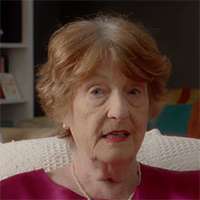 by WS Editors, Washington Spectator, Mar 28, 2023
by WS Editors, Washington Spectator, Mar 28, 2023
It’s been nearly 40 years since If You Love This Planet won the Academy Award for Best Short Documentary.
The film is comprised of a lecture given to students by the celebrated nuclear critic Dr. Helen Caldicott, president at the time of Physicians for Social Responsibility.
With the growing intensity of the conflict in Ukraine, and the corresponding potential for the deployment of nuclear weapons, Dr. Caldicott’s decades-old warning against the use of the atomic bomb is fresh and resonant.
Caldicott analyzes the medical and geo-physical consequences of the detonation of a modern nuclear weapon, explains why there is no surviving a nuclear war, and exposes the folly of superpower arguments on behalf of maintaining tactical nuclear superiority. The film ends with her call for citizen action, and this timeless and poetic plea:
“If you love this planet, and you watch the spring come, and you watch magnolias flower, and you watch the wisteria come out, and you smell a rose, you will realize that you are going to have to change the priorities of your life. If you love this planet.”
Four decades after “If You Love this Planet” was released, Helen Caldicott, now 85, sat down for this interview at her home in Australia. She notes the absence of progress toward the eradication of nuclear weapons, and decries the failure of the nuclear states to eliminate the greatest threat to human survival.
Arguably the most articulate and forceful advocate for disarmament and abolition in the nuclear era, Dr. Helen Caldicott has devoted the last forty two years to an international campaign to educate the public about the medical hazards of the nuclear age and the necessary changes in human behavior to prevent environmental destruction.
In 1971, Dr. Caldicott played a major role in Australia’s opposition to French atmospheric nuclear testing in the Pacific; in 1975 she worked with the Australian trade unions to educate their members about the medical dangers of the nuclear fuel cycle, with particular reference to uranium mining.
While living in the United States from 1977 to 1986, as President of Physicians for Social Responsibility, she helped invigorate an organization of 23,000 doctors committed to educating their colleagues about the dangers of nuclear power, nuclear weapons and nuclear war. The international umbrella group (International Physicians for the Prevention of Nuclear War) won the Nobel Peace Prize in 1985. She also founded the Women’s Action for Nuclear Disarmament (WAND) in the US in 1980.
Dr. Caldicott has received many prizes and awards for her work, including the Lannan Foundation’s 2003 Prize for Cultural Freedom and twenty one honorary doctoral degrees. The Smithsonian named Helen Caldicott one of the most influential women of the 20th Century.
Originally published: https://washingtonspectator.org/spotlight-on-dr-helen-caldicott/